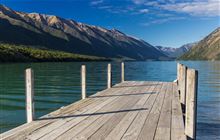'Lake snow' a threat this summer
Archived content: This media release was accurate on the date of publication.
Introduction
Nelson’s pristine clear alpine Lake Rotoiti, a favourite for boating and fishing, could be impacted by 'lake snow' this summer.Date: 04 August 2021
Water sampling by the Department of Conservation (DOC) and Tasman District Council last summer has confirmed that the invasive microscopic algae Lindavia intermedia is present in both Lakes Rotoiti and Rotoroa in Nelson Lakes National Park.
Lindavia can produce what is known as ‘lake snow’, a sticky, mucus-like substance that hangs under the water and can be a nuisance by sticking to fishing gear, boats, motors, and people. If it gets into the residential water supply, it can cause blockages, and clogs filters in household appliances connected to the system.
The density of Lindavia in Lake Rotoiti was found to be increasing this autumn, leading Phil Novis from Manaaki Whenua – Landcare Research to forecast that there is a significant risk of lake snow developing in the lake next summer.
Department of Conservation Nelson Lakes Operations Manager John Wotherspoon says this is extremely disappointing and concerning news.
“There is no known control or eradication method. It is unfortunately here to stay.
“Fortunately, it is not toxic to humans or livestock and poses no risk from food sourced from the lakes. However, the impact of the algae on the lake’s ecology and health is not understood and requires further research.”
This microscopic algal species is a relatively recent introduction to New Zealand, first found in 2002. It is now known from a number of large pristine lakes in Otago and Canterbury, as well as a couple of lakes in the North Island. It is not known from any other lakes in the northern South Island except Maitai Reservoir near Nelson.
In some lakes, such as Lake Wanaka, lake snow is regularly formed and is a significant nuisance, whereas in others it is only occasional. There was no lake snow observed in Lakes Rotoiti or Rotoroa last summer, but it is not known what will happen in the long term.
John Wotherspoon says the priority now is to prevent the spread of Lindavia to the nearby small alpine lakes such as Rotomairewhenua/Blue Lake and Rotomaninitua/Lake Angelus. Testing is yet to be done on these lakes.
“Of particular concern is Rotomairewhenua/Blue Lake which is world-renowned for the clarity of its water. It would be devastating if Lindavia got a foothold there.”
Tasman District Council, DOC, Ministry for Primary Industries and Fish & Game New Zealand are all working to combat the spread of the microscopic algae which is easily carried on watercraft, trailers, clothing, boots, animals, tramping equipment and fishing gear.
Phil Novis says it only takes one droplet of contaminated water or one small piece of the ‘slime’ to infect a new water body.
“We can limit the spread of lake snow by being vigilant. Check, Clean and Dry any wet or damp items and be especially cautious before going to a different lake or waterway.”
Contact
For media enquiries contact:
Email: media@doc.govt.nz

